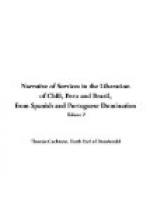Finding that I would not consent to avert the naval force from the purposes to which it was destined, the project was abandoned; but the troops which had advanced to Chancay were ordered to fall back on Haura, this step being actually a further retreat as regarded the position of the Spanish forces, which thus managed to check further desertion by apprehending and shooting all who attempted it.
Still General San Martin was determined, if possible, to accomplish his views on Guayaquil. Two deputies, Tomas Guido and Colonel Luzuriago, were despatched with complimentary messages to Torre Tagle and others, warning them against the designs of Bolivar, whose success in the north led San Martin to fear that he might have designs on Peru. The deputies were strictly enjoined to represent that if such were Bolivar’s intention, Guayaquil would only be regarded as a conquered province; whilst, if the people of that place would adhere to him, he would, on the fall of Lima, make it the principal port of a great empire, and that the establishment of the docks and arsenals which his navy would require, would enrich the city beyond measure. They were at the same time exhorted to form a militia, in order to keep out Bolivar.
By way of conciliating me, General San Martin proposed in a flattering way to call the captured frigate the “Cochrane,” as two vessels before had been named the “San Martin,” and “O’Higgins;” but to this I demurred, as acquiescence in such a proceeding might in the estimation of others have identified me with any course the general might be inclined to pursue, and I had already formed my conjectures as to what were evidently his future purposes. Finding me firm in declining the proffered honour, he told me to give her what name I thought proper; but this was also refused, when he said, “Let her be called the ‘Valdivia,’ in memory of your conquest of that place;” her name was accordingly changed from the Esmeralda to the Valdivia.
The command of the frigate had been given to Captain Guise; and after her change of name, his officers wrote to him a letter deprecating the name, and alleging, that as they had nothing to do with the conquest of Valdivia, it ought to be withdrawn, and one more consonant with their feelings substituted. This letter was followed by marked personal disrespect towards myself, from the officers who had signed it, who made it no secret that the name of Guise was the one sought to be substituted.
As the conversations held by these officers with the rest of the squadron were of such a derogatory nature as regarded my character and authority, as might lead to serious disorganization, I brought the whole of the officers who had signed the letter to a court-martial, two being dismissed the service, the remainder being dismissed the ship, with a recommendation to General San Martin for other appointments.
During the arrest of these officers, I had determined upon an attack upon the fortifications of Callao, intending to carry them by a coup de main, similar to that which had succeeded at Valdivia, and having, on the 18th, taken soundings in the Potrillo, was convinced of the feasibility of the plan.




